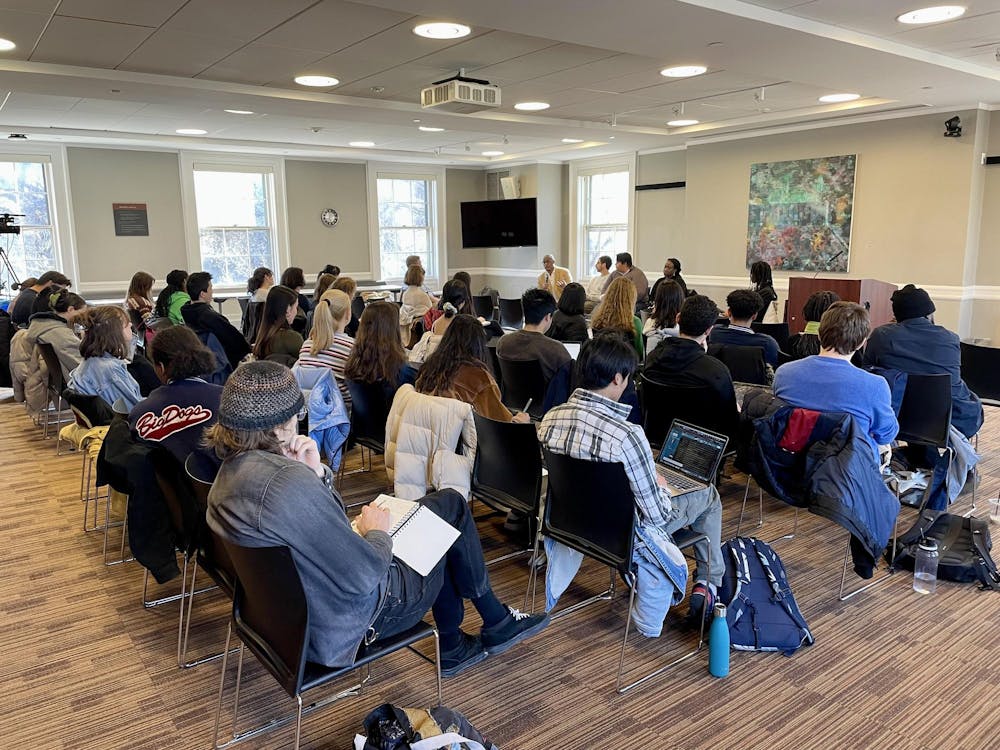On Friday afternoon, about 30 students and community members gathered in the Petteruti Lounge for the Department of English’s first-ever Inclusive Journalism Conference. Organized by Nell Lake, a lecturer in English non-fiction writing, the three-and-a-half-hour event featured a roundtable discussion with a diverse panel of journalists followed by workshops on inclusive coverage and reporting.
Lake hoped that the conference would emphasize how “journalism is critical to society, democracy and social justice,” she told conference attendees before the roundtable discussion.
Lake, who has taught multiple journalism courses at Brown since joining the University faculty in 2022, has long wanted to “offer a curriculum that would address issues of social inclusion and equity” in reporting, she said in an interview with The Herald.
The conference gave Lake the opportunity to bring these discussions to campus “through the perspectives and experiences of people in marginalized positions, not just through the things I assigned (in class) as a white, cisgender woman,” she told The Herald.
Boston Globe climate reporter Ivy Scott ’21.5 moderated the two-hour discussion, which included ESPN features writer Katie Barnes and Vox policy correspondent Abdallah Fayyad. It also featured Dalila Paul, who is a national editor at Capital B News, and Phillip Martin, a senior investigative reporter for the GBH News Center for Investigative Reporting.
Panelists began the event by discussing the role of identity in journalism. Barnes, a nonbinary journalist who covers policies affecting transgender athletes, told conference attendees that identity-based perspectives “shape everything that we do when it comes to journalism.”
Scott added that her experiences as a Black woman have previously allowed her to “touch on topics and ask questions" that she wouldn't have otherwise been able to.
“Our backgrounds are not something that we put away and check at the door when we come to work,” she said. “These are things that really need to come with us sometimes.”
When asked about the role of objectivity in journalism, most panelists agreed that fairness — not just objectivity — is key when covering marginalized communities and controversial topics.
“Objectivity means something different to almost every journalist, every newsroom,” Fayyad told the attendees. “Oftentimes, it’s confused with neutrality, but being objective doesn’t mean being neutral.”
“If I’m missing the perspective of anyone around the topics that I report on, then my story is incomplete, and it’s not doing the service to the public that I wanted it to do,” Barnes said. “It’s less about being objective, and more about fairly representing the discourse as it is happening.”
Martin and Paul emphasized the power of newsroom higher-ups in determining what events and perspectives are covered by the publication — what Martin called “agenda-setting.”
“Early on, most of my bosses were white men and white women who had never been to a Black neighborhood, so they had no experience with” different types of people, Paul said. “How are you really objective if you’re making a decision based on ignorance?”
Toward the end of the discussion, audience members were given the opportunity to ask questions to the panelists. When asked whether the panelists had ever felt that they were the “wrong” reporter to cover a particular issue or event, Fayyad told the attendees that “there is no ‘wrong reporter’ for a story.”
“The only way you’re the ‘wrong reporter’ is if you’re a bad reporter,” he said. “Your background matters in how it informs your approach, but ultimately, it’s your humanity and your humility” that matter most.
After the roundtable discussion, students had the opportunity to attend one of five different workshops, each led by one of the panelists on topics ranging from inclusive reporting and audio journalism to opinion pieces and scene writing.
Paul hopes that sharing her perspectives and personal experiences with attendees will positively impact younger journalists, she said in an interview with The Herald. Overall, Paul found the conference “affirming.”
Gabriella Lui ’26 appreciated the diversity of the panel. The panelists “come from all different walks of life, from all different points in their career, and they all have a very specific niche,” she said. “That offered a lot of perspective.”
The roundtable discussion “brought a lot of the issues that students grapple with in classes down to earth,” Lake said. Following the conference, she hopes to bring more professional journalists to campus.
Additional reporting by Ryan Doherty.
Julianna Chang is the managing editor of production and development of The Herald's 135th Editorial Board. She previously served as a university news editor overseeing the academics & advising and student government beats. A junior from the Bay Area, Julianna is studying Biology and Political Science on the pre-medical track. When she's not in class or in the office, she can be found eating some type of noodle soup and devouring bad books.





